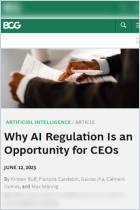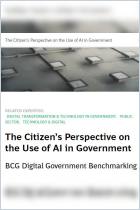Join getAbstract to access the summary!

Join getAbstract to access the summary!
Steven Mills and Kirsten Rulf
Finding Your Way Through AI’s Regulatory Jungle
A conversation with BCG’s Steven Mills and Kirsten Rulf
Boston Consulting Group, 2023
What's inside?
If you find it next to impossible to understand the complex web of new AI regulations, you’re not alone – learn what you can do to ensure you don’t fall behind in leveraging AI’s potential.
Recommendation
As the EU moves to enact new AI regulations, the rest of the world is slowly following suit. Glean useful insights from Boston Consulting Group’s Steven Mills and Kirsten Rulf on how best to navigate the complex landscape of AI regulation, without impeding your ability to innovate or jeopardizing the public good. Most companies that will implement AI models are far from ready, explain Rulf and Mills, as they’re making the mistake of waiting to see what the new AI regulations are before taking action. Learn what steps you can take to ensure you’re prepared to implement AI responsibly today, while maintaining your competitive edge.
Summary
About the Authors
Steven Mills is a managing director, partner and the chief AI ethics officer at Boston Consulting Group Gamma in Washington, DC. Kirsten Rulf is a partner and associate director at Boston Consulting Group in Berlin.

























Comment on this summary